Pengupahan Buruh Panen Padi di Desa Pagersari, Mungkid, Magelang (Analisis Hukum Islam)
Downloads
Wage of paddy labors in villages is mostly based on heredity habits. This practice occurs continuously in muamalah activities as in Pagersari village, Mungkid, Magelang. This research aims to analyze the wage of paddy labors in Pagersari village by looking at the condition of the people who do not understand the conformity of the practice with the Islamic law rules about wage. The method used in this research was descriptive analysis with qualitative approach. The data collection techniques were using interviews, field studies, and documentation studies. Meanwhile the data analysis techniques covered the data reduction, the data presentation, and conclusion drawing. This research was done by people who practice the wage of paddy labors. The result of the research shows that those practices according to Islamic law are categorized in fikih muamalah; that is ijarah based on works (ijarah ala al amal) which has been fulfilled the contract basis (rukun akad). The wage received is bawon gabah with the comparison system 12:1, 13:1, and 14:1 from the harvest which is divided between the laborers and the farmers in kilogram units. The wage is categorized ajrul misli; that is worth it with the works and the working conditions. As seen from the appropriateness in Islamic law, the wage practice has fulfilled the worthiness and virtue elements. It just has not fulfilled the element of justice in the form of transparency in the distribution of wage in the balance.
Downloads
Afrizal. 2016. Metode Penelitian Kualitatif: Sebuah Upaya Mendukung Penggunaan Penelitian Kualitatif dalam Berbagai Disiplin Ilmu. Jakarta: RajaGrafindo Persada.
Al-Bukhari. 2004. Sahih Al-Bukhari, Juz II. Bandung: Pustaka Setia.
Basyir, Ahmad Azhar. 2004. Asas-Asas Hukum Muamalah (Hukum Perdata Islam). Yogyakarta: UII Press.
BPS, Magelang. 2013. Hasil Sensus Pertanian 2013 (Angka Tetap). 2013. htts://magelangkab.bps.go.id.
Depag. 2010. Al-Qur'an Tajwid Dan Terjemah. Bandung: CV Penerbit Diponegoro.
Depdikbud. 1997. Kamus Umum Bahasa Indonesia. Jakarta: Balai Pustaka.
FirmanSYah, Rachmad, and Moh. Qudzy Fauzy. 2016. Sistem Upah Minimum Kabupaten Dalam Perspektif Islam (Studi Kasus Pada Upah Minimum Kabupaten Sidoarjo). Jurnal Ekonomi Syariah Teori Dan Terapan 4 (6):34-48.
Harsono, X Soni. 2014. Analisis Hukum Islam Terhadap Tradisi Upah Bebasan Dan Borongan Buruh Tani Di Desa Brudu Kecamatan Sumobito Kabupaten Jombang. Universitas Islam Negeri Sunan Ampel Surabaya.
Huda, Nurul. 2009. Ekonomi Makro Islam: Pendekatan Teoritis. Jakarta: Kencana.
Muslich, Ahmad Wardi. 2010. Fiqh Muamalat. Jakarta: Amzah.
Priyadi, Unggul, and Jannahar Shidiqie. 2015. Pelaksanaan Perjanjian Bagi Hasil Pertanian Lahan Sawah Studi Di Kecamatan Gamping, Kabupaten Sleman, Yogyakarta. Millah 15 (101-115).
Rahman, Ahmad. 1995. Doktrin Ekonomi Islam Jilid II. Yogyakarta: PT. Dana Bhakti Wakaf.
Ridwan, Murtadho. 2013. Standar Upah Pekerja Menurut Sistem Ekonomi Islam. Jurnal Equilibrium 1 (2):241-57.
Sayyid, Sabiq terj. Nor Hasanuddin dkk. 2004. Fiqih Sunnah. Jakarta: Pena Pundi Aksara.
Siswadi. 2014. Pemberian Upah Yang Benar Dalam Islam Upaya Pemerataan Ekonomi Umat Dan Keadilan. Jurnal Ummul Qura IV (2):105-16.
Suhendi, Hendi. 2014. Fiqh Muamalah. Jakarta: PT RajaGrafindo Persada.
Copyright (c) 2019 Aprilia Risma Yanti

This work is licensed under a Creative Commons Attribution-ShareAlike 4.0 International License.








